|
Shawn Carlson, let me begin with you. Ready or not, the campaign is
upon us, what would you like to hear the candidates debate and discuss?
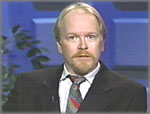 SHAWN
CARLSON: Well, there are two issues that I think are very important.
First is what are we going to do with the surplus, how real is the surplus,
how long will it actually last, and can it really save Social Security
and is the present Social Security system as it is worth saving? Right
now, Washington seems to think that if you delay a catastrophe that's
the same as fixing the problem, and what they want to do with Social
Security, as I understand it, is take the tax revenue that they've collected
from the surplus and continued to pour that into the mouth of the monster
to keep the system solvent for an additional 35 years. It's still -
that may help me, but it's not going to help my children, and I would
like to see this problem -- it's been solved three times already in
my lifetime -- I would like to see that problem actually solved. The
other thing I'm most passionate about is the future of science education
in this country. We do an abysmal job at educating young people in the
sciences; many countries do much better. If we are going to continue
to be a world leader in technology, we have to do much better. And I
would like to see some of the candidates describe their programs to
reach out into the grassroots and to find people who are doing exciting
and interesting and innovative things that are inspiring passion in
science for young people and producing future scientists. SHAWN
CARLSON: Well, there are two issues that I think are very important.
First is what are we going to do with the surplus, how real is the surplus,
how long will it actually last, and can it really save Social Security
and is the present Social Security system as it is worth saving? Right
now, Washington seems to think that if you delay a catastrophe that's
the same as fixing the problem, and what they want to do with Social
Security, as I understand it, is take the tax revenue that they've collected
from the surplus and continued to pour that into the mouth of the monster
to keep the system solvent for an additional 35 years. It's still -
that may help me, but it's not going to help my children, and I would
like to see this problem -- it's been solved three times already in
my lifetime -- I would like to see that problem actually solved. The
other thing I'm most passionate about is the future of science education
in this country. We do an abysmal job at educating young people in the
sciences; many countries do much better. If we are going to continue
to be a world leader in technology, we have to do much better. And I
would like to see some of the candidates describe their programs to
reach out into the grassroots and to find people who are doing exciting
and interesting and innovative things that are inspiring passion in
science for young people and producing future scientists.
TERENCE SMITH: All right. Campbell McGrath, science education, Social
Security, what's on your list?
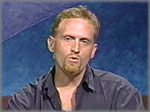 CAMPBELL
MC GRATH: Education is a big concern of mine, specifically in the sciences,
not specifically in the arts where I'm located, but just everywhere.
General public education for kids - I've taught in public schools as
a visiting writer in New York City. My son goes to public school in
Miami Beach, and while I don't have the answers, I know that money and
attention would go a long way towards helping at least improve our public
educational system. My overriding concern these days is with the influence
of money on the political system, campaign finance reform is a simple
term for it, but just in general the pervasive influence money has on
our political structure, I really can't see any justification for that,
other than that people are addicted to the lucre they've got running
right now, and nobody really wants to turn off the spigot. CAMPBELL
MC GRATH: Education is a big concern of mine, specifically in the sciences,
not specifically in the arts where I'm located, but just everywhere.
General public education for kids - I've taught in public schools as
a visiting writer in New York City. My son goes to public school in
Miami Beach, and while I don't have the answers, I know that money and
attention would go a long way towards helping at least improve our public
educational system. My overriding concern these days is with the influence
of money on the political system, campaign finance reform is a simple
term for it, but just in general the pervasive influence money has on
our political structure, I really can't see any justification for that,
other than that people are addicted to the lucre they've got running
right now, and nobody really wants to turn off the spigot.
|
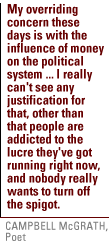 |
|
TERENCE SMITH: Sara Horowitz, what would you add or subtract to that
list?
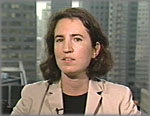 SARA
HOROWITZ: Well, I think that I, like a lot of Americans, would really
like to hear the candidates acknowledge that there's a new way that
people are working, that in our nation's history this is the third big
transformation in work. The first was craft work created by the industrial
revolution; the second was mass production; and now we're in some kind
of new phase that seems to involve high-tech and information-based technology.
Work is short term. People are working - about a third of the work force
is working as freelance, part-time, temp., consulting, and this really
extends from really low-wage workers up to middle class. And why this
is important is that this whole work force is just falling out of the
New Deal safety net. On the low end they're just going without health
insurance and pensions. A third of this work force is ineligible for
unemployment. On the high end, people are struggling to buy health insurance,
struggling to figure out how they do their asset allocation to make
sure that when they retire, they have a pension. And I think you can
see that there's this tremendous kind of economic insecurity in a time
of an economic boom. And that's because work is just so unpredictable.
People spend half the time looking for work and then half the time doing
the work, and I feel it's very difficult to live that kind of life and
they're not getting the same kind of advantages from the tax code and
the insurance industries to enable them to be mobile. SARA
HOROWITZ: Well, I think that I, like a lot of Americans, would really
like to hear the candidates acknowledge that there's a new way that
people are working, that in our nation's history this is the third big
transformation in work. The first was craft work created by the industrial
revolution; the second was mass production; and now we're in some kind
of new phase that seems to involve high-tech and information-based technology.
Work is short term. People are working - about a third of the work force
is working as freelance, part-time, temp., consulting, and this really
extends from really low-wage workers up to middle class. And why this
is important is that this whole work force is just falling out of the
New Deal safety net. On the low end they're just going without health
insurance and pensions. A third of this work force is ineligible for
unemployment. On the high end, people are struggling to buy health insurance,
struggling to figure out how they do their asset allocation to make
sure that when they retire, they have a pension. And I think you can
see that there's this tremendous kind of economic insecurity in a time
of an economic boom. And that's because work is just so unpredictable.
People spend half the time looking for work and then half the time doing
the work, and I feel it's very difficult to live that kind of life and
they're not getting the same kind of advantages from the tax code and
the insurance industries to enable them to be mobile.
TERENCE SMITH: Well, it sounds as though you want the candidates both
to address the issue and then to talk about some of its consequences.
SARA HOROWITZ: Right. I mean, I think the central issue is that, look,
if business needs to change and restructure, that's fine, but right
now business is calling for flexibility, and that's become a euphemism
for low wages and no benefits. Let's say, hey, we have a new work force
that's mobile. Let's have portable health insurance, portable pension.
Let's have portable rights. Let's make it so that goods and capital
can be mobile and we can really support our work force in being mobile,
and you can really tell that in this work force the candidates mostly
think that people are still working in traditional long-term jobs, and
they're kind of missing the boat for a third of us out there.
TERENCE SMITH: Wilma Subra, what would you add to that, from your perspective?
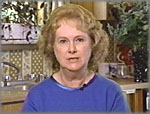 WILMA
ALPHA SUBRA: Well, I do a lot of work in the area of environmental protection
and the human health impacts from environmental issues. And when the
candidates talk about economic development, I'd like them to be required
to say how they're account for the impact on the community so that economic
development is occurring and how they are going to protect those people,
such as implementing buffer zones around new industrial facilities and
buyouts for people who live on the cents line and then the second issue
is how do you provide information to the people in these communities
about what they're being exposed to, how bad is the exposure, what they
can do to counteract exposure, and where they can get health care that's
designed primarily to deal with environmental exposure. WILMA
ALPHA SUBRA: Well, I do a lot of work in the area of environmental protection
and the human health impacts from environmental issues. And when the
candidates talk about economic development, I'd like them to be required
to say how they're account for the impact on the community so that economic
development is occurring and how they are going to protect those people,
such as implementing buffer zones around new industrial facilities and
buyouts for people who live on the cents line and then the second issue
is how do you provide information to the people in these communities
about what they're being exposed to, how bad is the exposure, what they
can do to counteract exposure, and where they can get health care that's
designed primarily to deal with environmental exposure.
TERENCE SMITH: You used an interesting word there. You said the candidates
should be required to discuss this issue. Is there a feasible way to
do that?
WILMA ALPHA SUBRA: I think wherever you talk about economic development,
you also have to talk about how you're going to protect the environment
and the people living in it, because without a good environment, no
senior executives are going to want to bring this into an area that's
already polluted and put them there with poor schools and poor environment,
so it has to be an entire package.
TERENCE SMITH: Mark Danner, from your perspective, what would you like
to hear discussed and debated?
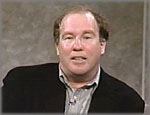 MARK
DANNER: Well, for the third time in this century America is coming out
of a war after the first two, World War I and then World War II, America
saw a major debate about the role of the country in the world. After
the first world war, of course, there was a strong debate about the
League of Nations, and the decision was finally made not to join it.
American power was withdrawn from Europe, and after the second world
war, the institutions were set up, NATO, the Marshall Plan, the Truman
Doctrine, that led America through the Cold War. We're at the end of
the Cold War now, long past the end of the Cold War, and it's become
striking that America's leaders do not know how to speak to American
citizens about foreign policy and about the place of the country in
the world. MARK
DANNER: Well, for the third time in this century America is coming out
of a war after the first two, World War I and then World War II, America
saw a major debate about the role of the country in the world. After
the first world war, of course, there was a strong debate about the
League of Nations, and the decision was finally made not to join it.
American power was withdrawn from Europe, and after the second world
war, the institutions were set up, NATO, the Marshall Plan, the Truman
Doctrine, that led America through the Cold War. We're at the end of
the Cold War now, long past the end of the Cold War, and it's become
striking that America's leaders do not know how to speak to American
citizens about foreign policy and about the place of the country in
the world.
The war we just have come out of in the last few days, that is, the
war in Kosovo, has made this very obvious. America's military leaders
are claiming a great victory, a victory without casualties, in the words
of one of them, but, in fact, there were a great many casualties, a
great many dead, as a matter of fact, among the people that the United
States had sworn to protect in Kosovo. There were also casualties, of
course, among civilians in Serbia. The war was fought a particular way
because American leaders are essentially afraid, at least in my view,
to make a political case, to use their political capital to try to persuade
the people why it's important to fight this particular war, and, indeed,
before that, why it was important to go to Somalia, why it was important
to go to Haiti, why it was important to intervene at a certain time
in Bosnia.
So I think there's a crying need, just an essential need for the United
States and its leaders to have an open and free debate about the role
of the country in the world. I think running a foreign policy essentially
based on empty rhetoric, which it's been since 1991 or so, and meanwhile
taking on responsibilities - for example - the enlargement of NATO,
which the United States has now signed up to protect - Poland, Hungary,
the Czech Republic - possibly up to and including the use of nuclear
weapons, without indeed the united American people - excuse me - having
agreed or having come to a consensus on that responsibility, I think
that's a terrible thing, and it, indeed, leaves the country in a very
weak state.
|
|
|
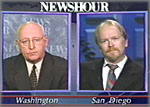 TERENCE
SMITH: And a suitable subject probably for this campaign. Shawn Carlson,
you mentioned science education. Do you see or have you heard that subject
raised so far? And what's your level of confidence that it will be? TERENCE
SMITH: And a suitable subject probably for this campaign. Shawn Carlson,
you mentioned science education. Do you see or have you heard that subject
raised so far? And what's your level of confidence that it will be?
SHAWN CARLSON: Well, I haven't heard any discussion about it. People
have to realize that education ain't just readin', writing, and arithmetic
anymore, and when the candidates have discussed education, everybody
wants to be the education president, but despite 30 years of everybody
wanting to be the education president and everybody talking about this
issue, very little has gotten done. There are some really great ideas
that are out there in the public sector that are being put into practice
in small areas, and I think that this is a place where the government
can learn from the creative and innovative people who are passionate
about this issue. So far, I haven't heard it mentioned. I think that
people should appreciate its importance. I think everything that the
other panelists have mentioned are also very important issues as well.
I'm very impressed, because I've heard some really original and new
ideas here today. But the science issue has not yet been addressed,
and it doesn't - it doesn't sound like it's going to be, because people
don't seem to appreciate its importance of it.
TERENCE SMITH: I'm sorry.
WILMA ALPHA SUBRA: May I just add something to what Shawn just said?
TERENCE SMITH: Yes.
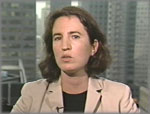 SARA
HOROWITZ: I think we're at a very interesting time, as they say, in
our history where a lot of the innovation really is sort of under -
underground right now. You really can see that there are a lot of ideas,
and that it's the institutions that are in place that don't quite fit
on so many levels, from labor to education, to housing, to the environment,
and that it really - it requires a kind of - not only imagination but
courage of your own conviction to follow those ideas that are good ideas
and to be a megaphone for those ideas, and that's what the candidates
could do that I think people would feel there's a tremendous resonance.
They say they're talking about me; whereas, now I think they feel like,
yeah, yeah, you're the education guy, uh-huh. SARA
HOROWITZ: I think we're at a very interesting time, as they say, in
our history where a lot of the innovation really is sort of under -
underground right now. You really can see that there are a lot of ideas,
and that it's the institutions that are in place that don't quite fit
on so many levels, from labor to education, to housing, to the environment,
and that it really - it requires a kind of - not only imagination but
courage of your own conviction to follow those ideas that are good ideas
and to be a megaphone for those ideas, and that's what the candidates
could do that I think people would feel there's a tremendous resonance.
They say they're talking about me; whereas, now I think they feel like,
yeah, yeah, you're the education guy, uh-huh.
TERENCE SMITH: Right. Campbell McGrath, I wonder if you share Shawn
Carlson's concern that the talk about education in his view has been
rather hollow up to this point.
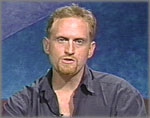 CAMPBELL
MC GRATH: Yes. Absolutely. And I agree with the larger point that a
lot of these - a lot of the thoughts I hear the five of us expressing
fall to the notion that the world has changed and become a radically
new place in many ways of our mentally business, education, and yet,
the system and the leaders of the system have not changed, and at the
same time, the leaders seem to lack courage either to change or even
to speak honestly without hypocrisy, without protecting themselves about
these issues, they're unwilling to run the risk of making a mistake
and alienating anyone, and so I feel like these ideals get shuffled
around, and paid lip service, but they don't really go anywhere. I think
that kind of - that, for me, would be the best thing to come out of
this campaign if through some kind of miracle, some candidate stood
up and in some way unmasked himself and said, I'm just going to run
my campaign free of that kind of hypocrisy, and truly honestly addressing
the world as we see it. CAMPBELL
MC GRATH: Yes. Absolutely. And I agree with the larger point that a
lot of these - a lot of the thoughts I hear the five of us expressing
fall to the notion that the world has changed and become a radically
new place in many ways of our mentally business, education, and yet,
the system and the leaders of the system have not changed, and at the
same time, the leaders seem to lack courage either to change or even
to speak honestly without hypocrisy, without protecting themselves about
these issues, they're unwilling to run the risk of making a mistake
and alienating anyone, and so I feel like these ideals get shuffled
around, and paid lip service, but they don't really go anywhere. I think
that kind of - that, for me, would be the best thing to come out of
this campaign if through some kind of miracle, some candidate stood
up and in some way unmasked himself and said, I'm just going to run
my campaign free of that kind of hypocrisy, and truly honestly addressing
the world as we see it.
TERENCE SMITH: All right. Wilma Subra, did you agree with that, and
we've heard some talk about the environment, but I wonder if it's as
directed as you want it to be.
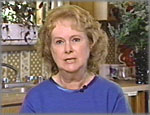 WILMA
ALPHA SUBRA: No, it isn't, and as a matter of fact, the federal government
is tending to de-centralize and pass it back down to the state level.
And I can tell you in a lot of the states that I work in across the
nation the states don't have the political will to take on the hard
challenges and deal with the issues and deal with them sort of outside
the box, as it be, so if the federal government decentralizes and the
candidates encourage that decentralization, the people at the grassroots
level are going to be the ones that are going to suffer, because there
won't be the political will to go out and do those hard things that
need to be done to protect the environment and protect human health. WILMA
ALPHA SUBRA: No, it isn't, and as a matter of fact, the federal government
is tending to de-centralize and pass it back down to the state level.
And I can tell you in a lot of the states that I work in across the
nation the states don't have the political will to take on the hard
challenges and deal with the issues and deal with them sort of outside
the box, as it be, so if the federal government decentralizes and the
candidates encourage that decentralization, the people at the grassroots
level are going to be the ones that are going to suffer, because there
won't be the political will to go out and do those hard things that
need to be done to protect the environment and protect human health.
TERENCE SMITH: All right. Mark Danner, can we have a for instance final
thought from you?
MARK DANNER: Well, I'd like to say that I was hopeful that the matters
I've mentioned - as far as international affairs were involved - will
be discussed in this campaign. But, frankly, in the last three, four,
five campaigns, they played a relatively small part, and so I have to
say even though some candidates - John McCain, for example, Pat Buchanan
- talked about Kosovo when it was happening, we've seen very little
indication that the so-called major candidates are going to make this
an important issue in that campaign.
 I
think that's a pity, but I think it's up to the journalists, people
who cover the campaign, and in the end the people who are polled, unfortunately,
by the candidates to figure out what, indeed, they're interested in,
to try to show that these are important issues and that the candidates
will have to address them. Perhaps an idealistic view, but I think everybody
today - it seems to me - has talked about things that are important
to people in this country. It's rather ironic that it's hard to know
whether, indeed, they'll be brought up at all in this discussion, long
discussion, leading up to this election. I
think that's a pity, but I think it's up to the journalists, people
who cover the campaign, and in the end the people who are polled, unfortunately,
by the candidates to figure out what, indeed, they're interested in,
to try to show that these are important issues and that the candidates
will have to address them. Perhaps an idealistic view, but I think everybody
today - it seems to me - has talked about things that are important
to people in this country. It's rather ironic that it's hard to know
whether, indeed, they'll be brought up at all in this discussion, long
discussion, leading up to this election.
TERENCE SMITH: Well, this may be the first step in the process.
MARK DANNER: I hope so.
TERENCE SMITH: Thank you all very much.
|
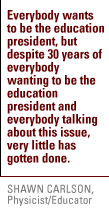 |
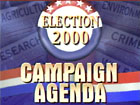


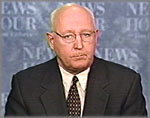 TERENCE
SMITH: Recently the McArthur Foundation announced its 1999 fellowships
-- the so-called "Genius Awards" -- given to individuals who show exceptional
merit and promise for creative work in their field. We decided to ask
five of them to share their ideas on the upcoming presidential campaign.
Sara Horowitz is executive director of Working Today, which represents
temporary workers and the self employed. Mark Danner is an author and
journalist who is a staff writer at the New Yorker Magazine;
he specializes in foreign affairs. Shawn Carlson is an educator and
physicist who is an adjunct professor in Physics at San Diego State
University. Wilma Alpha Subra is a chemist and environmentalist. She
is president of Subra Company, a chemistry lab and environmental consulting
firm in New Iberia, Louisiana. Campbell McGrath is a poet and associate
professor at Florida International University. Welcome to you all.
TERENCE
SMITH: Recently the McArthur Foundation announced its 1999 fellowships
-- the so-called "Genius Awards" -- given to individuals who show exceptional
merit and promise for creative work in their field. We decided to ask
five of them to share their ideas on the upcoming presidential campaign.
Sara Horowitz is executive director of Working Today, which represents
temporary workers and the self employed. Mark Danner is an author and
journalist who is a staff writer at the New Yorker Magazine;
he specializes in foreign affairs. Shawn Carlson is an educator and
physicist who is an adjunct professor in Physics at San Diego State
University. Wilma Alpha Subra is a chemist and environmentalist. She
is president of Subra Company, a chemistry lab and environmental consulting
firm in New Iberia, Louisiana. Campbell McGrath is a poet and associate
professor at Florida International University. Welcome to you all. SHAWN
CARLSON: Well, there are two issues that I think are very important.
First is what are we going to do with the surplus, how real is the surplus,
how long will it actually last, and can it really save Social Security
and is the present Social Security system as it is worth saving? Right
now, Washington seems to think that if you delay a catastrophe that's
the same as fixing the problem, and what they want to do with Social
Security, as I understand it, is take the tax revenue that they've collected
from the surplus and continued to pour that into the mouth of the monster
to keep the system solvent for an additional 35 years. It's still -
that may help me, but it's not going to help my children, and I would
like to see this problem -- it's been solved three times already in
my lifetime -- I would like to see that problem actually solved. The
other thing I'm most passionate about is the future of science education
in this country. We do an abysmal job at educating young people in the
sciences; many countries do much better. If we are going to continue
to be a world leader in technology, we have to do much better. And I
would like to see some of the candidates describe their programs to
reach out into the grassroots and to find people who are doing exciting
and interesting and innovative things that are inspiring passion in
science for young people and producing future scientists.
SHAWN
CARLSON: Well, there are two issues that I think are very important.
First is what are we going to do with the surplus, how real is the surplus,
how long will it actually last, and can it really save Social Security
and is the present Social Security system as it is worth saving? Right
now, Washington seems to think that if you delay a catastrophe that's
the same as fixing the problem, and what they want to do with Social
Security, as I understand it, is take the tax revenue that they've collected
from the surplus and continued to pour that into the mouth of the monster
to keep the system solvent for an additional 35 years. It's still -
that may help me, but it's not going to help my children, and I would
like to see this problem -- it's been solved three times already in
my lifetime -- I would like to see that problem actually solved. The
other thing I'm most passionate about is the future of science education
in this country. We do an abysmal job at educating young people in the
sciences; many countries do much better. If we are going to continue
to be a world leader in technology, we have to do much better. And I
would like to see some of the candidates describe their programs to
reach out into the grassroots and to find people who are doing exciting
and interesting and innovative things that are inspiring passion in
science for young people and producing future scientists. CAMPBELL
MC GRATH: Education is a big concern of mine, specifically in the sciences,
not specifically in the arts where I'm located, but just everywhere.
General public education for kids - I've taught in public schools as
a visiting writer in New York City. My son goes to public school in
Miami Beach, and while I don't have the answers, I know that money and
attention would go a long way towards helping at least improve our public
educational system. My overriding concern these days is with the influence
of money on the political system, campaign finance reform is a simple
term for it, but just in general the pervasive influence money has on
our political structure, I really can't see any justification for that,
other than that people are addicted to the lucre they've got running
right now, and nobody really wants to turn off the spigot.
CAMPBELL
MC GRATH: Education is a big concern of mine, specifically in the sciences,
not specifically in the arts where I'm located, but just everywhere.
General public education for kids - I've taught in public schools as
a visiting writer in New York City. My son goes to public school in
Miami Beach, and while I don't have the answers, I know that money and
attention would go a long way towards helping at least improve our public
educational system. My overriding concern these days is with the influence
of money on the political system, campaign finance reform is a simple
term for it, but just in general the pervasive influence money has on
our political structure, I really can't see any justification for that,
other than that people are addicted to the lucre they've got running
right now, and nobody really wants to turn off the spigot. SARA
HOROWITZ: Well, I think that I, like a lot of Americans, would really
like to hear the candidates acknowledge that there's a new way that
people are working, that in our nation's history this is the third big
transformation in work. The first was craft work created by the industrial
revolution; the second was mass production; and now we're in some kind
of new phase that seems to involve high-tech and information-based technology.
Work is short term. People are working - about a third of the work force
is working as freelance, part-time, temp., consulting, and this really
extends from really low-wage workers up to middle class. And why this
is important is that this whole work force is just falling out of the
New Deal safety net. On the low end they're just going without health
insurance and pensions. A third of this work force is ineligible for
unemployment. On the high end, people are struggling to buy health insurance,
struggling to figure out how they do their asset allocation to make
sure that when they retire, they have a pension. And I think you can
see that there's this tremendous kind of economic insecurity in a time
of an economic boom. And that's because work is just so unpredictable.
People spend half the time looking for work and then half the time doing
the work, and I feel it's very difficult to live that kind of life and
they're not getting the same kind of advantages from the tax code and
the insurance industries to enable them to be mobile.
SARA
HOROWITZ: Well, I think that I, like a lot of Americans, would really
like to hear the candidates acknowledge that there's a new way that
people are working, that in our nation's history this is the third big
transformation in work. The first was craft work created by the industrial
revolution; the second was mass production; and now we're in some kind
of new phase that seems to involve high-tech and information-based technology.
Work is short term. People are working - about a third of the work force
is working as freelance, part-time, temp., consulting, and this really
extends from really low-wage workers up to middle class. And why this
is important is that this whole work force is just falling out of the
New Deal safety net. On the low end they're just going without health
insurance and pensions. A third of this work force is ineligible for
unemployment. On the high end, people are struggling to buy health insurance,
struggling to figure out how they do their asset allocation to make
sure that when they retire, they have a pension. And I think you can
see that there's this tremendous kind of economic insecurity in a time
of an economic boom. And that's because work is just so unpredictable.
People spend half the time looking for work and then half the time doing
the work, and I feel it's very difficult to live that kind of life and
they're not getting the same kind of advantages from the tax code and
the insurance industries to enable them to be mobile. WILMA
ALPHA SUBRA: Well, I do a lot of work in the area of environmental protection
and the human health impacts from environmental issues. And when the
candidates talk about economic development, I'd like them to be required
to say how they're account for the impact on the community so that economic
development is occurring and how they are going to protect those people,
such as implementing buffer zones around new industrial facilities and
buyouts for people who live on the cents line and then the second issue
is how do you provide information to the people in these communities
about what they're being exposed to, how bad is the exposure, what they
can do to counteract exposure, and where they can get health care that's
designed primarily to deal with environmental exposure.
WILMA
ALPHA SUBRA: Well, I do a lot of work in the area of environmental protection
and the human health impacts from environmental issues. And when the
candidates talk about economic development, I'd like them to be required
to say how they're account for the impact on the community so that economic
development is occurring and how they are going to protect those people,
such as implementing buffer zones around new industrial facilities and
buyouts for people who live on the cents line and then the second issue
is how do you provide information to the people in these communities
about what they're being exposed to, how bad is the exposure, what they
can do to counteract exposure, and where they can get health care that's
designed primarily to deal with environmental exposure. MARK
DANNER: Well, for the third time in this century America is coming out
of a war after the first two, World War I and then World War II, America
saw a major debate about the role of the country in the world. After
the first world war, of course, there was a strong debate about the
League of Nations, and the decision was finally made not to join it.
American power was withdrawn from Europe, and after the second world
war, the institutions were set up, NATO, the Marshall Plan, the Truman
Doctrine, that led America through the Cold War. We're at the end of
the Cold War now, long past the end of the Cold War, and it's become
striking that America's leaders do not know how to speak to American
citizens about foreign policy and about the place of the country in
the world.
MARK
DANNER: Well, for the third time in this century America is coming out
of a war after the first two, World War I and then World War II, America
saw a major debate about the role of the country in the world. After
the first world war, of course, there was a strong debate about the
League of Nations, and the decision was finally made not to join it.
American power was withdrawn from Europe, and after the second world
war, the institutions were set up, NATO, the Marshall Plan, the Truman
Doctrine, that led America through the Cold War. We're at the end of
the Cold War now, long past the end of the Cold War, and it's become
striking that America's leaders do not know how to speak to American
citizens about foreign policy and about the place of the country in
the world.  TERENCE
SMITH: And a suitable subject probably for this campaign. Shawn Carlson,
you mentioned science education. Do you see or have you heard that subject
raised so far? And what's your level of confidence that it will be?
TERENCE
SMITH: And a suitable subject probably for this campaign. Shawn Carlson,
you mentioned science education. Do you see or have you heard that subject
raised so far? And what's your level of confidence that it will be? SARA
HOROWITZ: I think we're at a very interesting time, as they say, in
our history where a lot of the innovation really is sort of under -
underground right now. You really can see that there are a lot of ideas,
and that it's the institutions that are in place that don't quite fit
on so many levels, from labor to education, to housing, to the environment,
and that it really - it requires a kind of - not only imagination but
courage of your own conviction to follow those ideas that are good ideas
and to be a megaphone for those ideas, and that's what the candidates
could do that I think people would feel there's a tremendous resonance.
They say they're talking about me; whereas, now I think they feel like,
yeah, yeah, you're the education guy, uh-huh.
SARA
HOROWITZ: I think we're at a very interesting time, as they say, in
our history where a lot of the innovation really is sort of under -
underground right now. You really can see that there are a lot of ideas,
and that it's the institutions that are in place that don't quite fit
on so many levels, from labor to education, to housing, to the environment,
and that it really - it requires a kind of - not only imagination but
courage of your own conviction to follow those ideas that are good ideas
and to be a megaphone for those ideas, and that's what the candidates
could do that I think people would feel there's a tremendous resonance.
They say they're talking about me; whereas, now I think they feel like,
yeah, yeah, you're the education guy, uh-huh. CAMPBELL
MC GRATH: Yes. Absolutely. And I agree with the larger point that a
lot of these - a lot of the thoughts I hear the five of us expressing
fall to the notion that the world has changed and become a radically
new place in many ways of our mentally business, education, and yet,
the system and the leaders of the system have not changed, and at the
same time, the leaders seem to lack courage either to change or even
to speak honestly without hypocrisy, without protecting themselves about
these issues, they're unwilling to run the risk of making a mistake
and alienating anyone, and so I feel like these ideals get shuffled
around, and paid lip service, but they don't really go anywhere. I think
that kind of - that, for me, would be the best thing to come out of
this campaign if through some kind of miracle, some candidate stood
up and in some way unmasked himself and said, I'm just going to run
my campaign free of that kind of hypocrisy, and truly honestly addressing
the world as we see it.
CAMPBELL
MC GRATH: Yes. Absolutely. And I agree with the larger point that a
lot of these - a lot of the thoughts I hear the five of us expressing
fall to the notion that the world has changed and become a radically
new place in many ways of our mentally business, education, and yet,
the system and the leaders of the system have not changed, and at the
same time, the leaders seem to lack courage either to change or even
to speak honestly without hypocrisy, without protecting themselves about
these issues, they're unwilling to run the risk of making a mistake
and alienating anyone, and so I feel like these ideals get shuffled
around, and paid lip service, but they don't really go anywhere. I think
that kind of - that, for me, would be the best thing to come out of
this campaign if through some kind of miracle, some candidate stood
up and in some way unmasked himself and said, I'm just going to run
my campaign free of that kind of hypocrisy, and truly honestly addressing
the world as we see it. WILMA
ALPHA SUBRA: No, it isn't, and as a matter of fact, the federal government
is tending to de-centralize and pass it back down to the state level.
And I can tell you in a lot of the states that I work in across the
nation the states don't have the political will to take on the hard
challenges and deal with the issues and deal with them sort of outside
the box, as it be, so if the federal government decentralizes and the
candidates encourage that decentralization, the people at the grassroots
level are going to be the ones that are going to suffer, because there
won't be the political will to go out and do those hard things that
need to be done to protect the environment and protect human health.
WILMA
ALPHA SUBRA: No, it isn't, and as a matter of fact, the federal government
is tending to de-centralize and pass it back down to the state level.
And I can tell you in a lot of the states that I work in across the
nation the states don't have the political will to take on the hard
challenges and deal with the issues and deal with them sort of outside
the box, as it be, so if the federal government decentralizes and the
candidates encourage that decentralization, the people at the grassroots
level are going to be the ones that are going to suffer, because there
won't be the political will to go out and do those hard things that
need to be done to protect the environment and protect human health.